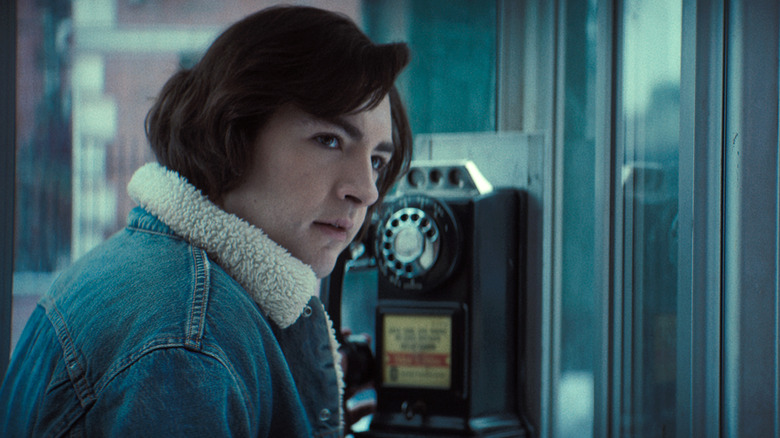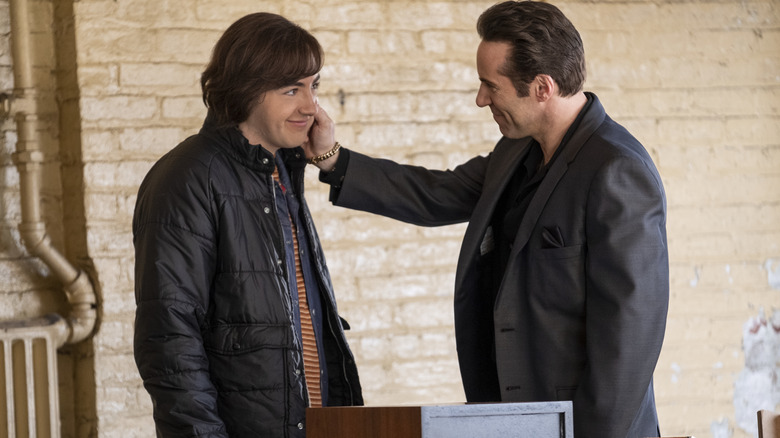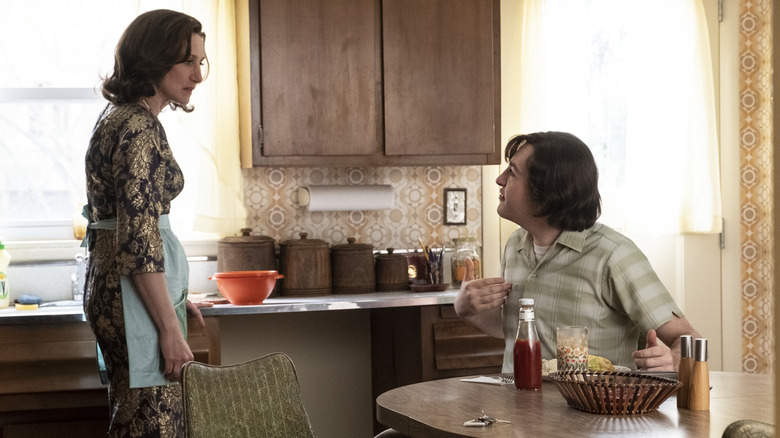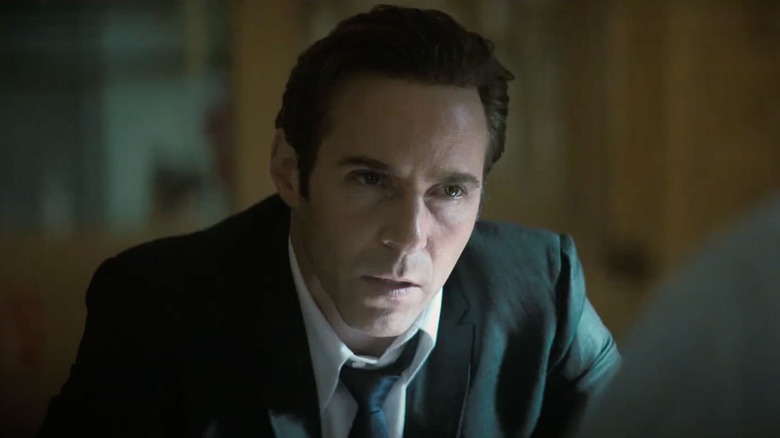The Many Saints Of Newark Ending Explained: Who Made Tony Soprano?
"The Many Saints of Newark" brings us back to the world of "The Sopranos." The film, which is now in theaters and on HBO Max, is a prequel set in the late 1960s and early 1970s, where Tony Soprano is still just a kid. He's surrounded by younger versions of other "Sopranos" characters, but the real focus of "The Many Saints of Newark" is a character we never met on the show – Dickie Moltisanti. Dickie was long-dead in "The Sopranos" timeline, and while the hit mob series had more than a few flashbacks to Tony's youth, we never got to see Dickie – until now.
As played by Alessandro Nivola, Dickie becomes the mentor to the young Tony (played by Michael Gandolfini, son of the late, great James Gandolfini). He's not related to Tony by blood, but he's thought of as an uncle – and he's the cool uncle, too. The one who is willing to give Tony advice – and stolen merchandise. Dickie thinks he's doing right by his "nephew," but what he's really doing is leading the kid down a doomed path; a path that will eventually turn Tony into a murderous mob boss.
By the time "The Many Saints of Newark" ends, the film answers a question being asked on the posters: Who made Tony Soprano? So let's take a look at "The Many Saints of Newark" ending, and how it relates to "The Sopranos" as a whole. As you might've guessed, there are major spoilers here, so you probably shouldn't read this until you've actually seen the movie.
Uncle Dickie
While Tony Soprano is a character in "The Many Saints of Newark," the film's main focus is on Dickie Moltisanti, Tony's mentor and defacto uncle. Dickie is a local mobster who runs with Tony's father, Johnny Boy (Jon Bernthal), and Tony's actual uncle, Junior (Corey Stoll). But these blood relations feel very distant to Tony. Tony's father spends a large part of his childhood in prison, and when he gets out, he seems to have almost nothing to do with his son. We learn Tony is a bright kid, but he has no real guidance – aside from Dickie. And that's not such a great thing.
Why? Because Dickie is a violent gangster with a murderous temper. Throughout the course of the film, we see him bump off several characters, including people close to him. In a fit of rage, Dickie murders his own father (Ray Liotta) by bashing the man's head against a steering wheel. After this murder, Dickie ends up in a romantic relationship with his father's new bride, AKA his stepmother (Michela De Rossi). But that ends badly too, with Dickie later drowning the woman in yet another rage-induced incident.
In the midst of all this, Dickie keeps trying to convince himself he's a good guy. Sure, he does bad things. But he does good things, too! He coaches a little league team for blind kids. And, of course, he tries to mentor Tony. Early in the film, he tells Tony that the kid "has to be good" and stop getting in trouble. He even makes Tony pinky swear that he'll "be good." Dickie also takes time to pay frequent visits to his incarcerated uncle (also played by Ray Liotta). But his uncle is a much different man than his brutal father, and keeps trying to convince Dickie that even if he thinks he's doing good things, he's nowhere near being a good person. He even advises Dickie to stay away from Tony, because he knows that sooner or later, Dickie is going to completely corrupt the kid.
The Fate of Tony Soprano
Tony's life is directionless. He's a smart kid who doesn't apply himself, and he's in serious danger of having no real future. It doesn't help that his mother (Vera Farmiga) is a manipulative, mentally unstable woman who has no idea how to communicate with her son. The only real direction Tony gets is from Dickie. Dickie even hooks Tony up with some expensive, stolen speakers. Tony hesitates at first. He mentions that he wants to go to college, and his college plans will be screwed if he gets caught with stolen merchandise.
"Look, you wanna be a civilian, I appreciate that," Dickie says, but then immediately adds: "Take the speakers, and tell yourself, 'This is it. This is the last time I'm ever going to steal something.' It's that simple." This is Dickie's idea of good advice, but of course, he's just teaching his nephew to steal and then lie to himself about what he's done. But things change when Dickie gets the advice to leave Tony alone. He takes it to heart – he really does want to do right by the kid. So he starts giving Tony the cold shoulder, ignoring the kid when he comes around looking for him. This confuses and angers Tony because he doesn't understand why his beloved uncle has suddenly shunned him. In anger, Tony throws the stolen speakers out his bedroom window, smashing them to pieces.
Pinky Swear
While all of this is unfolding, we also focus on a new character to the "Sopranos" world: Harold McBrayer (Leslie Odom Jr.), a Black man who starts off working for Dickie. Harold eventually decides that he wants to go into business for himself – he's tired of taking orders from racist white guys like Dickie and his mob buddies. And so Harold starts knocking off locations that are supposed to be part of Dickie's turf, essentially starting a mini mob war with Dickie and his crew.
"The Many Saints of Newark" fakes us out a bit here. Harold eventually declares that he's going to kill Dickie. Meanwhile, Dickie starts to feel bad about cutting Tony off and decides to meet with his nephew. He sets up a meeting date, but he never makes it. Instead, Dickie is shot in the back of the head while unloading the trunk of his car one night. At first, we think that Harold made good on his threat, and bumped off Dickie. But that turns out to not be the case. Instead, it's revealed that Tony's real uncle, Junior, is the one who had Dickie killed. Why? Because Dickie spent years making fun of him to his face. In Dickie's mind, he was just taking part in that age-old wiseguy tradition of busting balls. But Junior's pride was too wounded, and he secretly had Dickie whacked in the end.
In the final scene, Tony attends Dickie's wake, where Dickie lays dead in an open casket. Here, Tony imagines Dickie reaching his dead hand up, pinky extended. Like they did when he was younger, Tony and Dickie lock pinkies, agreeing to a silent bond. The implication is clear: Tony will follow in Dickie's footsteps. He'll become a mobster, and any hope he might have had of getting away from this violent, deadly life has been completely extinguished. Fuggedaboutit.



